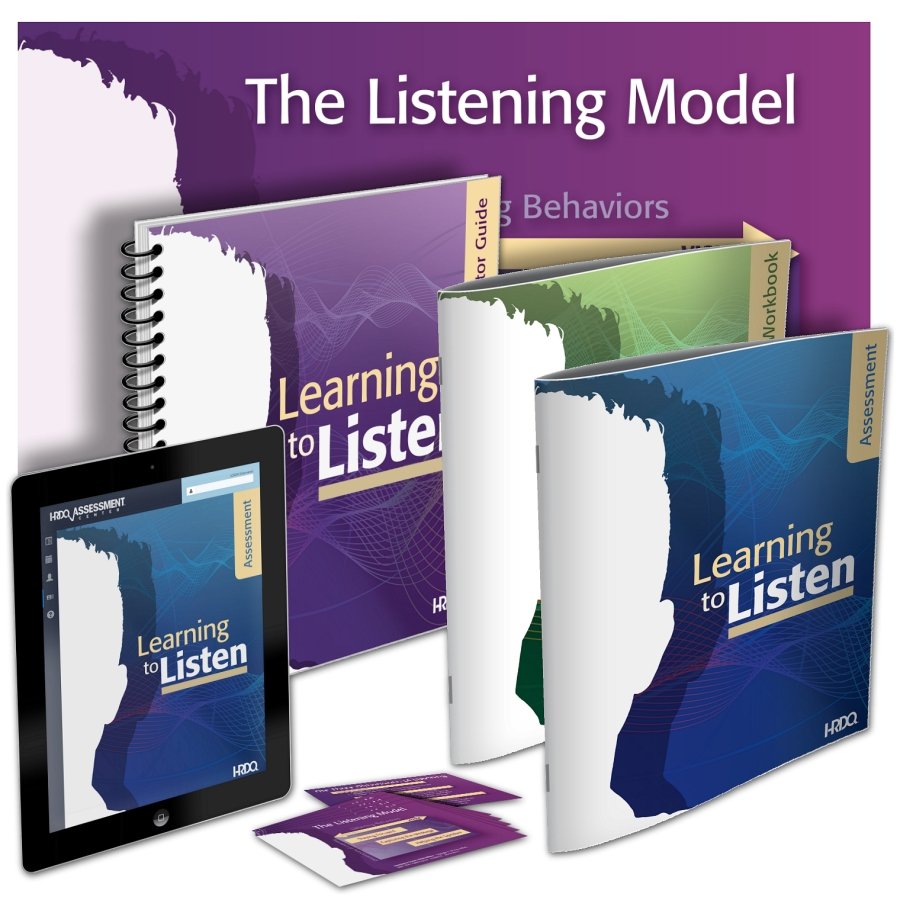Share
What Are Some Common Barriers to Effective Listening?
Bradford R. GlaserDid you know that people only remember about half of what was said immediately after listening to someone else talk? This information is quite concerning, considering how essential communication is for success and growth in the business world.
More and more teams are spread further apart with remote work solutions, and as such, more and more people are overwhelmed with messages, emails, and video calls. And as more tasks are being automated with AI and new technologies, uniquely human skills are in demand. The need for people who can cut through the noise and help others feel heard is on the rise.
According to WifiTalents, 70% of workplace mistakes are caused by poor communication, and organizations with high levels of active listening report 50% higher employee engagement.
With these stats, effective workplace communication can’t be ignored. Whether you feel like your listening skills could be improved or that your business is suffering from ineffective listening, we'll break down the common barriers to effective listening and help you make the necessary changes to improve communication.
When you improve workplace communication, you build stronger teams that can tackle any problem. Employees feel more engaged and connected to their work, creating a better workplace culture where people choose to stay. And better internal communication creates fewer errors and smoother service for customers and clients.
Some listening barriers that stand in the way of include physical and environmental, while others might be psychological, emotional, or cultural.
When communicating in the office, several elements interact: the speaker, the listener, and the environment. Therefore, if miscommunication is a frequent problem, identifying where the issue stems from is the first step in creating a more productive workplace. So, let's get started and learn how to improve communication!

- Determine listening effectiveness
- Overcome barriers to listening
- Create an action plan
Table of Contents
- What Is Effective Listening?
- What Are the Types of Ineffective Listening?
- Common Barriers to Effective Listening
- 1. Physical and Environmental Barriers
- 2. Cultural Barriers
- 3. Emotional and Psychological Barriers
- 4. Physiological Barriers
- 5. Language Barriers
- 6. Making Assumptions
- 7. Too Much Information
- 8. Tone of Voice
- 9. Speed of Speech
- 10. Time Pressure
- 11. Interruption
- Signs of Ineffective Listening
- How Can You Overcome Barriers to Effective Listening?
What Is Effective Listening?
When individuals effectively listen, they actively absorb the information they receive. In addition, they provide feedback to the person who is speaking, so they understand that they are being heard. Their body language and facial expressions show they are interested and listening.
In a busy, tech-driven world, it is more challenging than ever for people to be present enough to listen to one another, which is why working on your listening skills is a crucial step in how to improve communication.

There are countless benefits to promoting a workplace that engages in effective listening, including:
- Being able to solve problems better
- Improving accuracy
- Building relationships
- Ensuring understanding
- Less wasted time
- Fewer errors
Luckily, effective listening is a skill that can be developed with practice when you know how to improve communication. Let's take a look at some of the common barriers to effective listening to help you overcome the obstacles that might be standing in the way of optimal communication.
For more information on how to improve communication with key skills, check out this article on the six essential types of listening skills.
What Are the Types of Ineffective Listening?
Several different types of ineffective listening are worth understanding when trying to solve communication problems in the workplace. Though ineffective listening isn't always the listener's fault (for example, the presence of physical listening barriers that make it hard for them to hear what's going on), sometimes the problem is attitudinal.
1. Evaluative listening: Sometimes, listeners put all their energy into evaluating what is being said from their point of view rather than trying to take in what is being said with an open mind.
2. Self-protective listening: It's also not uncommon for individuals to be so consumed by their personal and emotional situations that they aren't fully present when a speaker is talking. Though they might be displaying the cues of a person who is listening, they aren't really engaging with the conversation.
3. Assumptive listening: When a listener listens assumptively, it means they assume that they understand the intention or meaning of the speaker before they have even finished making their point. Rather than actually hearing what is being said, their mind is busy trying to figure out where they think the speaker is coming from.

4. Affirmative listening: Some listeners only hear messages that they agree with and let the rest go in one ear and out the other. You might find that they agree with many of your points but seem to disregard equally valid and important points.
5. Judgmental listening: A judgmental listener has preconceived notions about the speaker and constantly criticizes what is being said.
6. Authoritative listening: Sometimes, an individual will respond to every conversation or talk as if it's an opportunity for them to give advice. They often start sentences using phrases like "You need to…" or "You should…" and act as if they know what is best in all situations.
7. Defensive listening: In other instances, people will take everything that is being communicated as a personal attack. Even when the topic has nothing to do with them, they feel the need to defend themselves in nearly all interactions. These listeners also tend to struggle with exploring different points of view.
Common Barriers to Effective Listening
1. Physical and Environmental Barriers
The most obvious obstacle to effective listening is anything that physically makes it difficult to hear what is being said. This might be due to too much distance between the speakers, excessive external noise, or physical obstructions blocking sound from traveling between individuals.

A person's ability to listen effectively can also be hindered by environmental factors such as temperature and lighting. For example, an uncomfortably hot room can distract someone from fully paying attention to a speaker, and a room that is too dark could leave them tired and disengaged.
Even how furniture is arranged can impact a person's ability to listen. While some seating arrangements encourage listening, others discourage it and separate people.
2. Cultural Barriers
When people have different religious, ethnic, cultural, or other backgrounds, it can create cultural barriers that make it difficult to listen effectively.

For example, cultural barriers can emerge when two companies from different parts of the world are doing business together. Each business might have customs and social norms informed by its respective cultural context.
3. Emotional and Psychological Barriers
We've already talked about external noise creating an obstacle to effective listening, but there's also something known as psychological noise.
That is the mental noise that emerges from our mood and energy level. It becomes difficult to receive and process information when you're in a more extreme mood, whether positive or negative. For example, it can be just as distracting to be madly in love as it can be to feel consumed by anger.

Both excited arousal and anxious arousal can negatively impact our ability to listen. An employee who is eager to start their weekend is likely not going to be fully listening to what is being said, much in the same way an employee who is worried about losing their job will struggle to listen effectively.
How we think can also get in the way of actively listening. Sometimes, we are quick to judge what is being said by another person, or we feel we know what they're going to say before they say it. This can influence our ability to hear what is being communicated.
4. Physiological Barriers

It's hard to be fully present when we aren't feeling our best. If a person is suffering from an injury, an illness, or bodily stress, it can hinder their ability to hear and process what is being said.
5. Language Barriers
Another thing that can hinder the ability to listen actively is a language barrier – when two or more people are communicating and they don't speak the same native language or have distinctly different accents. Language barriers can also emerge within the same language if the parties involved are from different regions or cultures and use expressions unknown to each other.

Effectively listening when there is a language barrier isn't, by any means, impossible. However, it can take more empathy and attention to ensure you fully understand the communication occurring.
6. Making Assumptions

We aren't practicing effective listening when we make assumptions about the speaker's intent or meaning before they have even finished their statement. A person might be biased against another individual and assume they hold certain beliefs, even though they haven't gotten to know them.
For example, say Meghan at work explains her concerns about a project deadline, and before she can finish, her manager Tom interrupts her and says, "I know, you think the timeline is unrealistic because you never support tight schedules." When in reality, Meghan was going to share a creative solution to help the team meet the deadline.
7. Too Much Information
Have you ever felt so overwhelmed by something new and complex that you stopped being able to intake information? This situation is an example of another barrier to effective listening: information overload.

If a person doesn't seem to be actively listening to you, it might not be that they are being rude. It's possible that they've reached their limit regarding new information and are increasingly unable to be present and focused on what's being said.
8. Tone of Voice
The tone that a person uses to speak can also create barriers to effective listening. Not everyone will react the same way to different tones of voice, and two people might hear the same vocal tone in very different ways.

For example, one listener might find that an energetic speaker is engaging, while another might react emotionally to what they feel is a loud and angry tone.
9. Speed of Speech
When someone is talking too fast, it can be challenging for listeners to keep up with the conversation. Some people naturally have a fast pace of speech, while others might be talking faster than normal out of nervousness.

At the same time, a person talking too slowly can also lose their audience's attention. If they speak abnormally slow, listeners might start to disengage and no longer listen actively.
10. Time Pressure
When you run into someone you know, and you ask them how they've been, what do they say? Almost always, the response is busy.

It's common to feel like there isn't enough time in the day to get to everything that needs to be done. When we feel pressed for time, it becomes challenging to engage fully with what someone is saying. Whether you have a meeting in ten minutes or you're up against a deadline, feeling time pressure can mean that your ability to listen effectively is hindered because your attention is occupied by outside time pressures.
11. Interruption

Both the speaker and the listeners can be responsible for creating interruptions that make it difficult to listen effectively. The listener might chime in frequently and un-empathetically when the speaker is talking, making it difficult for everyone involved to follow along and focus. The speaker could also create interruptions by allowing environmental distractions to capture their interest and take them off track.
Signs of Ineffective Listening
There are several signs you can look out for if you feel your employees are inattentive when you're speaking to them.

These include:
- Disinterested posture: People who are effectively listening tend to lean slightly towards the person speaking. Someone who is leaning back, slouching, or constantly shifting their position might not be fully paying attention.
- Lack of eye contact: This can indicate shyness, but sometimes a lack of eye contact is because the individual isn't paying attention. In many instances, someone who is engaged with what is being said will make frequent eye contact with the speaker.
- Seeming distracted: A person doodling, fidgeting, yawning, or looking at their watch might not be fully present and listening to what is being said.
- Not offering nonverbal cues of active listening: Effective listeners tend to nod their heads and give other nonverbal cues that they are paying attention. When someone isn't giving these cues, they might be disengaged from the conversation.
Sometimes, listeners might appear to have a 'faraway' look, which could indicate that they are daydreaming and aren't paying attention.
How a person responds can also indicate whether or not they are engaged in the conversation. If someone changes the topic suddenly, they may have been caught in a separate stream of thought and not listening to what is being said. A person who interrupts with advice can also suggest that they haven't been fully listening, as they may have been more focused on thinking about how to respond rather than processing the speaker's words.
How Can You Overcome Barriers to Effective Listening?
Improving the listening skills of your team could be as simple as removing barriers to listening, like making minor changes to your workspace, or it could require making changes to your communication style in the office. If you find that the communication problems in your workplace seem to be stemming from a lack of listening skills among your workers, you'll want to take a different approach.

The first step to overcoming the barriers to effective listening in your office is to identify what is standing in the way of effective, productive, and efficient communication. The more you understand the impediments to active listening, the better equipped you'll be to create a workplace that excels at communication.
Are you looking to know how to improve communication? Are wanting to improve your listening skills or the listening skills of your employees? Be sure to take a look at our research-based self-assessment, Learning to Listen, which teaches the art of effective listening.
To learn more about listening and how to improve your listening skills, check out our article, "Assessing & Enhancing Listening Maturity: A Comprehensive Guide." Don’t let ineffective listening skills and communication problems stand in the way of your success. Additionally, if you have any questions or concerns, please feel free to leave a comment down below, and we'll be sure to get back to you!






















































2 comments
Really helpful
“Most people believe that their listening skills are where they need to be, even though they aren’t. A study at Wright State University surveyed more than 8,000 people from different verticals, and almost all rated themselves as listening as well as or better than their co-workers. We know intuitively that many of them are wrong.”
—Travis Bradberry